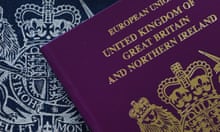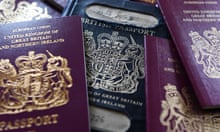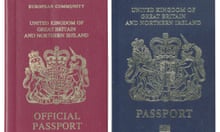The decision to award the contract to print Britain’s blue passports to an overseas firm is in effect final, the government has said, as Theresa May faced pressure to intervene over what critics have called a humiliating symbol of the post-Brexit future.
Brexiters reacted with anger to the news that the job will not go to Britain’s De La Rue, but has instead been awarded to Franco–Dutch firm Gemalto. De La Rue’s chief executive has called on ministers to think again.
The Home Office said the decision to pick a preferred bidder in the tender would save taxpayers about £120m over the five years of the contract.
A spokesman said: “The preferred bidder has been selected following a rigorous, fair and open competition and all bidders were notified of the outcome last night.
“The chosen company demonstrated that they will be best able to meet the needs of our passport service with a high quality and secure product at the best value for money for our customers and the taxpayer.”
The spokesman added that since 2009 UK passports could be manufactured overseas, and that this was the case for up to 20% of the current burgundy versions.
While Gemalto has not been formally named as the winning company, the Home Office said the choice of contractor would lead to the creation of about 70 jobs at Fareham in Hampshire and Heywood in Lancashire. One of Gemalto’s five current UK outposts is in Fareham.
Downing Street had said the final decision would not be made for several weeks. But May’s spokesman said later the preferred bidder had been picked, and would be named following a 10-day “standstill process”, in place for legal reasons.
News of the decision was greeted with anger by Brexit-minded Tory MPs. Priti Patel called it “a national humiliation”, while Bill Cash, the chairman of the Commons European scrutiny committee, called it “symbolically completely wrong”.
Liz Twist, the MP for Blaydon, whose constituency includes De La Rue’s Gateshead factory, said she hoped the home secretary, Amber Rudd, would meet her to discuss the situation.
She said: “At a time of heightened international security concerns, it is downright ludicrous to think that our new passports will be produced abroad. After months of talk about the return to blue British passports, the irony of this decision isn’t lost on me or my constituents.”
Matt Hancock, the culture secretary, sought to blame EU regulations on procurement. He told a Westminster reporters’ lunch: “There is an irony, which is these rules are European rules and we are going to be leaving the European Union and then we may be able to – if we choose to – set out our own procurement rules.”
May’s spokesman said World Trade Organisation rules also covered the same area but argued that Brexit should nonetheless bring more flexibility.
“What we have is a process we put out to tender,” he said. “We want to follow the correct process – that’s the right thing to do. That’s what we’re doing here. When we leave the EU we will have more power over setting our own procurement rules, but we will still follow a formal process.”
Len McCluskey, the leader of the Unite union, tweeted that the government should not “attempt to hide behind EU procurement rules”.
The official statements appear to dash the hopes of De La Rue seeing the decision overturned. Speaking to BBC Radio 4’s Today programme, its chief executive, Martin Sutherland, said May or Rudd, should “come to my factory and explain to my dedicated workforce why they think this is a sensible decision to offshore the manufacture of a British icon”.
He said he would appeal against the decision, and he refused to guarantee that no jobs would be lost at the Gateshead factory the firm uses to produce the current burgundy EU version.
Sutherland acknowledged that his company had been beaten on price in an open competition, but he said that was unfair. He said that in France, as a foreign-based firm, De La Rue would be barred from bidding to produce the French passport.
French passports are made by Imprimerie Nationale, the state-run French printing organisation, with the French government having made the decision not to put the job out to tender, as allowed under EU rules.
Gemalto said it was aware of reports regarding the contract, adding: “As the process is still ongoing and the terms of engagement are confidential, we cannot make any further comment on it at this stage.”









